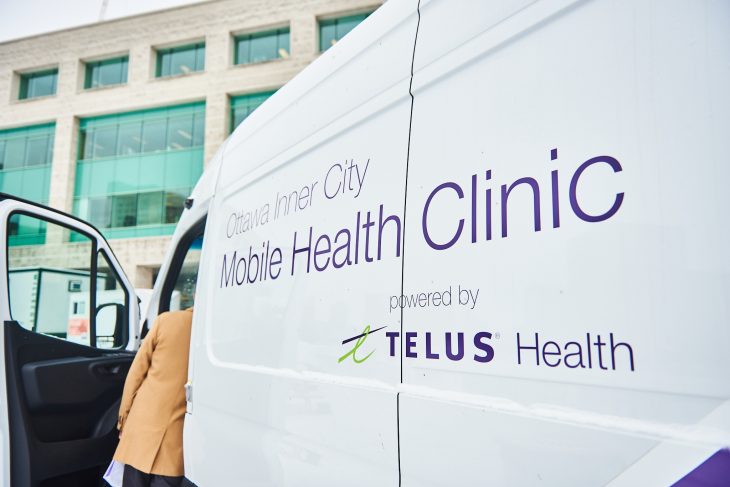
By Christopher Guly
OTTAWA – On any given day last month, about 180 drug users dropped by a supervised injection site operated by Ottawa Inner City Health in the parking lot of a homeless shelter in the city’s Byward Market neighbourhood. Most were men, with an average age of 45, struggling with mental-health issues and addicted to opioids.
“Many of them don’t have access to healthcare and mental-health care, which will drive opioid use,” Wendy Muckle, CEO of Ottawa Inner City Health, told Cartt.ca.
That will now change following Telus’s announcement on Tuesday that it has expanded its Health for Good program https://www.telus.com/en/about/company-overview/community-investment/how-we-give/cause-campaigns/health-for-good?INTCMP=VAN_healthforgood to launch an Ottawa Inner City Mobile Health Clinic that will serve four sites in the capital in partnership with Ottawa Public Health, The Royal mental-healthcare hospital and three community health centres, including Ottawa Inner City Health.
The initiative follows similar mobile health clinics active in Montreal, Victoria, Vancouver and Calgary as part of a five-year, $8-million investment.
“We are bringing necessary primary medical care to marginalized and vulnerable people on the streets and helping them to reconnect with the public healthcare system,” explained Jill Schnarr, vice-president of corporate citizenship at Telus, in an interview. “We’ve enabled over 20,000 patient visits since we launched Health for Good in 2014.”
The mobile clinics are large vans equipped with Telus Health’s electronic medical record technology and are driven by the company’s LTE network. Local community partners provide the physicians, nurses and paramedics who travel in the vehicle to provide primary healthcare and mental healthcare services at designated sites. The medical practitioners also have access to patient records in the city or, in the case of a patient with none, will create a new medical record for that individual and upload it into the system.
According to Schnarr, more than 25,000 physicians across Canada use Telus’s electronic medical records.
“When you’re homeless or part of a marginalized population, you don’t always feel comfortable walking into a traditional doctor’s office, so you’re not seeking out the medical care you need,” she said. “What we’ve done is brought care directly to the individual wherever they are in their community and it becomes part of that community so they become comfortable going to that clinic.”
Schnarr explained Telus is helping address some sombre statistics. “Based on our research, we found that over 235,000 Canadians face homelessness each year https://www150.statcan.gc.ca/n1/pub/75-006-x/2016001/article/14678-eng.htm – and we’re in the middle of a national opioid crisis where 14,000 Canadians have died from overdoses since 2016,” she said.
“We thought that it was part of our responsibility as the largest health-IT provider in Canada to ensure that we launch and provide these health clinics across the country.”
Telus’s launch of the Ottawa Inner City Mobile Health Clinic came at the right time, added Muckle. “As a community trying to help people who are using drugs and get ahead of the opioid crisis, this gives us an opportunity to bring a service to people where they are and not pose a barrier to engage with them around their healthcare.”
Over the next two months, Telus plans to launch similar mobile health clinics in additional cities, including Waterloo, Ont., Edmonton, Surrey, B.C. and Halifax.


